RELATED THEMES
development
social change
environment
OTHER LOCAL THEMES
agriculture
communications
community activities
culture and customs
economics
education
employment and income
environmental knowledge
family life
festivals
food security
gender
health
history
identity
livestock
migration
politics
social institutions
social relationships
spiritual beliefs
tourism
traditional skills
BACKGROUND
introducing the area
|
communications
 quotes about communications quotes about communications
 key
testimonies featuring communications key
testimonies featuring communications
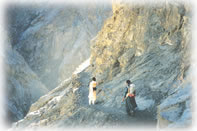 The journey to and from Shimshal and the coming of the road are major topics in this collection. At the time that most of the testimonies were collected, a link road from the Karakoram Highway to Shimshal village had been under construction for 17 years and was nearing completion. In September 2003 this road was completed. Whilst the completion of this road is evidently a key point in Shimshal's history it is important to see the road in the historical context of access to the village. Prior to the construction of the road the trail has been continually improved to create a safer, easier and quicker route to the nearest village of Passu (on the Karakoram Highway). The journey to and from Shimshal and the coming of the road are major topics in this collection. At the time that most of the testimonies were collected, a link road from the Karakoram Highway to Shimshal village had been under construction for 17 years and was nearing completion. In September 2003 this road was completed. Whilst the completion of this road is evidently a key point in Shimshal's history it is important to see the road in the historical context of access to the village. Prior to the construction of the road the trail has been continually improved to create a safer, easier and quicker route to the nearest village of Passu (on the Karakoram Highway).
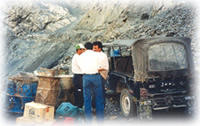 People have high expectations (both positive and negative) of the road. The words of one man express a sentiment shared by many: "[The road] will bring prosperity at the cost of disunity and destruction of moral values. It will facilitate multiple sources of income and then people will not care for each other" (Pakistan 10). While almost all emphasise the improvements the road will bring - transportation of people and provisions, increased marketing opportunities and being able to transport the sick to medical care quickly - there is concern about the impact it will have on village unity, culture and customs. Some also express concern that the increased presence of outsiders will restrict the freedom and safety of women in the village. People have high expectations (both positive and negative) of the road. The words of one man express a sentiment shared by many: "[The road] will bring prosperity at the cost of disunity and destruction of moral values. It will facilitate multiple sources of income and then people will not care for each other" (Pakistan 10). While almost all emphasise the improvements the road will bring - transportation of people and provisions, increased marketing opportunities and being able to transport the sick to medical care quickly - there is concern about the impact it will have on village unity, culture and customs. Some also express concern that the increased presence of outsiders will restrict the freedom and safety of women in the village.
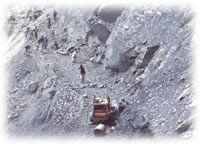 Clearly the journey to and from Shimshal has played a major role in many Shimshalis' life experiences. The difficulties of the journey in the past are described and many talk about the road in relation to the relief it will bring in terms of not having to carry everything on one's back. Previous difficult journeys are also used to illustrate the respect the younger generation had for the elders in the past: "…whenever any of the senior members of the trek would become exhausted due to a heavy load, during the trek the young would share his load and sometimes would even take the old man on their back particularly during river crossing. In turn the elders would offer part of their food to the young for their help" (Pakistan 18). Clearly the journey to and from Shimshal has played a major role in many Shimshalis' life experiences. The difficulties of the journey in the past are described and many talk about the road in relation to the relief it will bring in terms of not having to carry everything on one's back. Previous difficult journeys are also used to illustrate the respect the younger generation had for the elders in the past: "…whenever any of the senior members of the trek would become exhausted due to a heavy load, during the trek the young would share his load and sometimes would even take the old man on their back particularly during river crossing. In turn the elders would offer part of their food to the young for their help" (Pakistan 18).
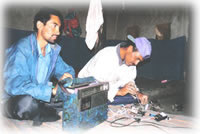 Two narrators (Pakistan 34 and Pakistan 13) describe how in the past the villagers used smoke signals to warn other villages of an impending flood starting in Shimshal. Similarly, dust clouds were created to inform those residing in Shimshal that there was a problem in Pamir. More recently the radio, and a radio phone have been key communication facilities. Raza (Pakistan 34) describes the importance of the radio: "there is no road link to the village and therefore we don't have newspapers and television in the village... We can only know the news around the world through radio.… Today we have a wireless set (radio phone) available in the village that keeps us in contact with other parts of the area. But prior to it radio was the only source of information. As important events, meetings etc. were announced through radio from radio station Gilgit." Two narrators (Pakistan 34 and Pakistan 13) describe how in the past the villagers used smoke signals to warn other villages of an impending flood starting in Shimshal. Similarly, dust clouds were created to inform those residing in Shimshal that there was a problem in Pamir. More recently the radio, and a radio phone have been key communication facilities. Raza (Pakistan 34) describes the importance of the radio: "there is no road link to the village and therefore we don't have newspapers and television in the village... We can only know the news around the world through radio.… Today we have a wireless set (radio phone) available in the village that keeps us in contact with other parts of the area. But prior to it radio was the only source of information. As important events, meetings etc. were announced through radio from radio station Gilgit."
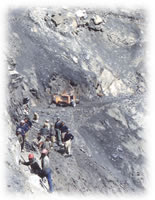 Farman (Pakistan 11), a journalist for a key national newspaper who lives in Islamabad, talks about the power of the media and how it can be used as a tool to influence politicians: "This is the only weapon of mine through which I can do something for my people. I can write, I can influence the government to… provide facilities to the people… It is the only effective tool through which we can influence the government." Farman (Pakistan 11), a journalist for a key national newspaper who lives in Islamabad, talks about the power of the media and how it can be used as a tool to influence politicians: "This is the only weapon of mine through which I can do something for my people. I can write, I can influence the government to… provide facilities to the people… It is the only effective tool through which we can influence the government."
There are a number of references to language throughout the testimonies, in terms of people's ability and inability to communicate with those outside Shimshal. Wakhi is Shimshalis' first language, spoken in some other valleys in Northern Pakistan, and parts of Afghanistan, China and Tajikistan.
quotes about communications
"We've got the cuk (spring), where all the village women gather… that's the place where locally we call it 'the radio station', because all the news will spread to the village from there, because women will all gather and you know gossip and chat about news and everything."
Inayat, M/27, development professional, Pakistan 2
[The media] is the only… effective tool through which we can influence the government… But the problem here is that the Urdu journalism is not disseminating the…correct information… to the people. The Urdu journalism is rather distorting the facts… And it is…giving more sectarian, news and stereotyped nationalist things to the people, that's very dangerous. But the [Pakistan] English [language] media is somewhat very serious, very sober, it is very secular..."
Farman, M/40s, journalist, Pakistan 11
When [there was a possibility that] the lake would burst the person close to the lake would light a fire in the night or make smoke in the daytime. The next person would immediately make a fire at his place that was visible to the next viewpoint. In this way the message that there is a flood would reach [the down valley] in minutes. The third way of delivering messages was that when someone would come from Pamir (pasture) he would create a dust cloud and people across the river in the village would understand that there was some emergency (in Pamir)..."
Raza, M/37, teacher, Pakistan 34
"There will be a great change in our village, first the people will become free of loads and will travel on vehicles, and then there will be shops and hotels in the village. A good hospital will be established here and we will enjoy all facilities at our doorstep. The visits of foreign tourists will increase and we will go trekking with them up to Pamir and would earn a lot of money. These benefits would be due to the road. In our time we experienced a miserable life, we would ford the river as much as 13 times and that exhausted us."
Bashi, M/67, farmer, Pakistan 14
"As the road has approached closer to the village it has eased our life, it has removed the load from the backs of our men… there will be a lot of development in the village… But the freedom of life, which we are enjoying today, this liberty will no longer exist when the road is linked. At present, wherever we want to go within our territory, we [women] can move without fear but when the road link is completed we will even have to lock our doors, which we keep unlocked today, as there is no fear and risk of theft etc."
Gulshad, F/40, farmer, Pakistan 17
"I recall that some 40 or 50 years back, when we travelled to and from Passu, we would cross the freezing river 30 times - even in weather below minus 10c. When we would enter the river, the ice would cut our legs and when we reached the other side of the river, we put on our sandals (long shoes made of animal skin) and put our trousers round our necks and walked in the freezing weather until we reached home."
Shogoon Muhammad, M/67, farmer, Pakistan 30
"Wakhi was the only language spoken by the people till 50 years back because there was no means of communication or interaction with the outside world. Now the youngsters go to other cities to get education as well as learn English, Urdu, Brushaski, Shina, Japanese and French languages. Urdu is spoken and understood by almost all youngsters and some aged people."
Qurban, M/60, farmer, Pakistan 28
"When I joined the army I couldn't speak with my colleagues, because of language problems, and I felt it very much. I would say that I was lucky that I got recruitment in the army… Now I am able to sit with a foreigner and talk to him in his language. If I couldn't have joined the army then I would be the same person as the people of my age are in our village… Today I think of myself in a better position than our other brothers living here."
Gonik, M/55, farmer/numayindar, Pakistan 25
|
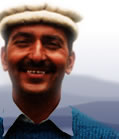


 The journey to and from Shimshal and the coming of the road are major topics in this collection. At the time that most of the testimonies were collected, a link road from the Karakoram Highway to Shimshal village had been under construction for 17 years and was nearing completion. In September 2003 this road was completed. Whilst the completion of this road is evidently a key point in Shimshal's history it is important to see the road in the historical context of access to the village. Prior to the construction of the road the trail has been continually improved to create a safer, easier and quicker route to the nearest village of Passu (on the Karakoram Highway).
The journey to and from Shimshal and the coming of the road are major topics in this collection. At the time that most of the testimonies were collected, a link road from the Karakoram Highway to Shimshal village had been under construction for 17 years and was nearing completion. In September 2003 this road was completed. Whilst the completion of this road is evidently a key point in Shimshal's history it is important to see the road in the historical context of access to the village. Prior to the construction of the road the trail has been continually improved to create a safer, easier and quicker route to the nearest village of Passu (on the Karakoram Highway). People have high expectations (both positive and negative) of the road. The words of one man express a sentiment shared by many:
People have high expectations (both positive and negative) of the road. The words of one man express a sentiment shared by many:  Clearly the journey to and from Shimshal has played a major role in many Shimshalis' life experiences. The difficulties of the journey in the past are described and many talk about the road in relation to the relief it will bring in terms of not having to carry everything on one's back. Previous difficult journeys are also used to illustrate the respect the younger generation had for the elders in the past:
Clearly the journey to and from Shimshal has played a major role in many Shimshalis' life experiences. The difficulties of the journey in the past are described and many talk about the road in relation to the relief it will bring in terms of not having to carry everything on one's back. Previous difficult journeys are also used to illustrate the respect the younger generation had for the elders in the past:  Two narrators (Pakistan 34 and Pakistan 13) describe how in the past the villagers used smoke signals to warn other villages of an impending flood starting in Shimshal. Similarly, dust clouds were created to inform those residing in Shimshal that there was a problem in Pamir. More recently the radio, and a radio phone have been key communication facilities. Raza (Pakistan 34) describes the importance of the radio:
Two narrators (Pakistan 34 and Pakistan 13) describe how in the past the villagers used smoke signals to warn other villages of an impending flood starting in Shimshal. Similarly, dust clouds were created to inform those residing in Shimshal that there was a problem in Pamir. More recently the radio, and a radio phone have been key communication facilities. Raza (Pakistan 34) describes the importance of the radio:  Farman (Pakistan 11), a journalist for a key national newspaper who lives in Islamabad, talks about the power of the media and how it can be used as a tool to influence politicians:
Farman (Pakistan 11), a journalist for a key national newspaper who lives in Islamabad, talks about the power of the media and how it can be used as a tool to influence politicians: